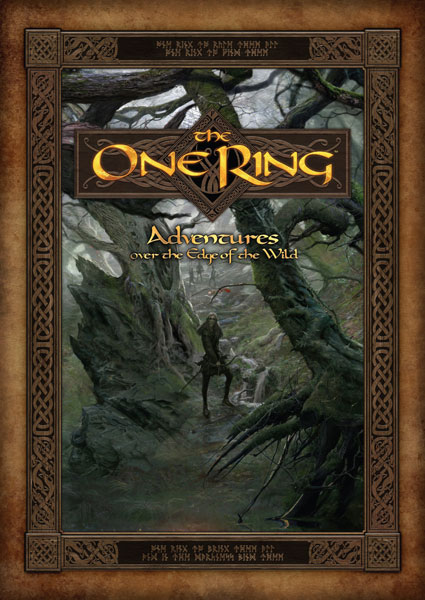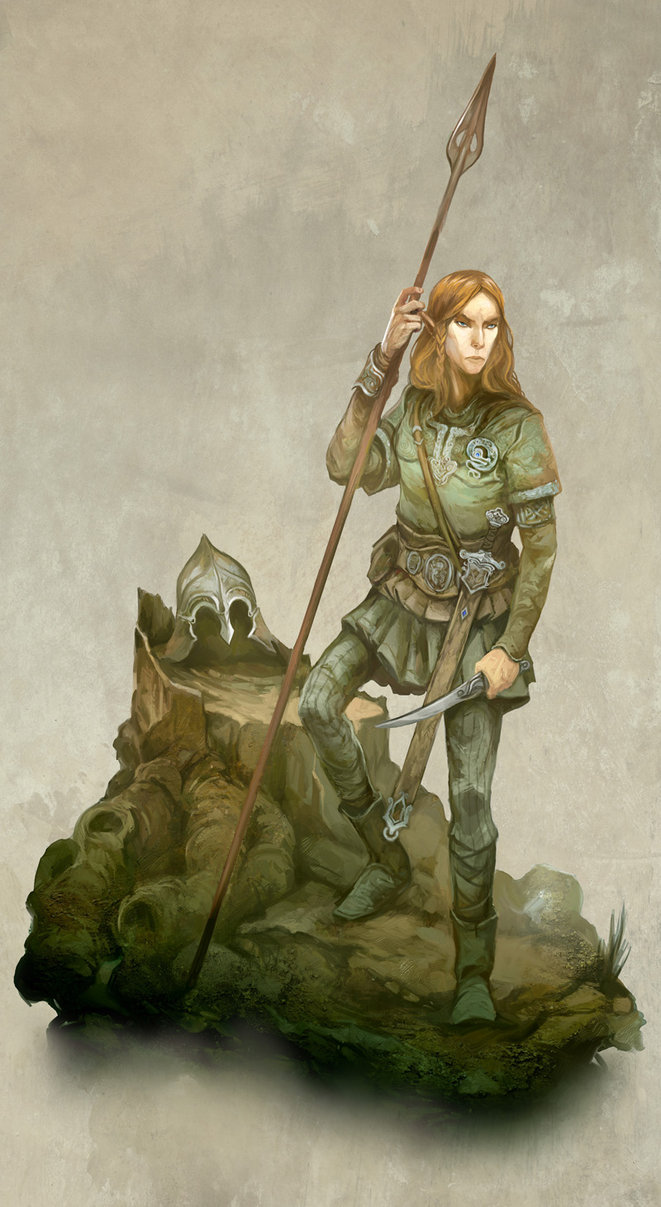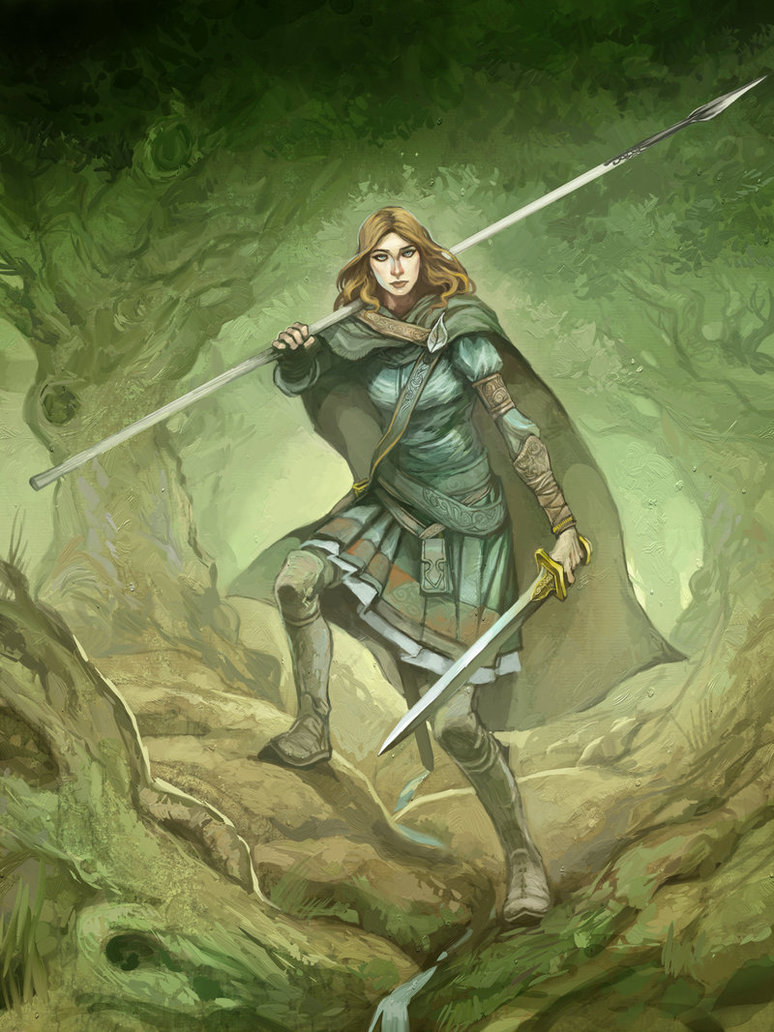The One Ring Adventures by Egregious Offences
| 1 | Introduction |
| 2 | Elves |
| 2.1 | Sample Elf |
Introduction
Original SA post
Alright, let's get this show on the road.

Introduction
The One Ring is, as you can see, a LOTR RPG. You are adventurers doing your adventuring thing in the Wildlands five years after Smaug was slain and the Battle of Five Armies was fought (this is actually very important, but later on).
So, as one would expect, adventuring isn't exactly something the average joe really strives to do. As the book says, "They are dangerous and rarely end well". But that doesn't discourage you, the Player Heroes, from donning the mantle of "adventurers" and delving into the treacherous wilderness to the east of the Misty Mountains, where there is plenty of danger and glory to go around.
How does it work?
TOR uses a roll-over system where, whenever a check needs to be made, the character/Lore Master (GM) rolls a 12-sided die (referred to as the "Feat Die") and as many 6 sided dice (referred to as "Success dice") as they have dots in that skill to try to meet a certain number, often 14. The feat die has two special symbols where the 11 and 12 would be, with the Eye of Sauron replacing the 11 and the Gandalf "G" rune replacing 12. These are important, because rolling a G means an immediate success, while rolling the Eye is a result of 0, and bad things tend to happen when you fail a roll because of the Eye. Also, the Success dice have these symbols underneath the 6 (the Tengwar number 1, if you want to look for it) which means, if the test succeeds, a success becomes a great success, or an excellent success, or even a superior success, depending on how many 6s were rolled.
The intro chapter also goes into detail about the two "phases" the game has: Adventuring and Fellowship. Adventuring is exactly what it sounds like; traveling, fighting orcs, exploring barrows, etc. The Fellowship phase, though, is where the heroes rest and recuperate in towns, use their hard-earned treasure, improve their skills and experience, and the other RP related things. There's also a paragraph about the concept of narrative time, where large chunks of time are abstracted (useful for long journeys, which take weeks of in-game time), versus episodes, where the players are in greater control over what happens and when it does (useful in the Fellowship phase, where the players will want to specify what they're doing with their down-time).
Before we move into Character Generation, I'm going to crib from the other TOR writeup and have you guys tell me what sort of characters, let's go with two of them, you want me to create. First things first, choose two cultures from the list.
Bardings
: Men of Dale and followers of Bard the Archer, slayer of Smaug and newly crowned king. Bardings are a prosperous people, due to trade and their proximity to the Dwarves, who are their staunch allies. They are quite brave, and with stout hearts.
Beornings
: The rag-tag groups of warriors, hunters and other folks wandering the wilderness without cause or allegiance that united under Beorn, the Skin-changer of Carrock (he can turn into a huge bear). His people are tough, strong and renown for their battle-fury.
Dwarves of the Lonely Mountain
: Since the victory over Smaug and the passing of the Battle of Five Armies, the dwarves have toiled ceaselessly to rebuild their fallen fortress home. However, some dwarves wish to see the Kingdom under the Mountain enter a new period of renown and splendor, and bring glory to their people and their home with tales of new heroes. Dwarves are skilled craftsmen, and can carry loads that would break the will and endurance of Men.
Elves of Mirkwood
: The wood-elves of Mirkwood were once known for their laughter that would ring throughout the wood, but now the forest is silent, a testament to the changes the Mirkwood has gone through since the Shadow has fallen over it. Now, the elves are constantly vigilant of the threat that the Enemy poises to the people of the Wilderlands and the Mirkwood. Their eternal watchfulness is aided by their affinity for the shadows of trees or night, where their senses and abilities are improved.
Hobbits of the Shire
: After Bilbo returned to the Shire with wild tales of adventure and peril beyond the safety and comfort of the Shire, many respectable hobbits simply denounced his stories as fiction, and that he never left his hobbit-hole at all. Nevertheless, some hobbits are inspired by these tales to leave the predictable security of the Shire and seek fortune and fame in the Wilderlands, where their natural charm and sense of practicality makes them valuable members of the party.
Woodmen of Wilderland
: Frontiersman of the north of Mirkwood, the Woodmen have lived in the Wood and fought the Shadow as long as they know. Aiding them is the wizard Radagast, residing in their land in his home Rhosgobel. He is a master of beasts, and his knowledge has been a great boon to the Woodmen, who are themselves skilled hunters, animal tamers and foresters.
Elves
Original SA post
Going alphabetically, Elves are first. So let's go with that.

Alright, with the disturbances in the Mirkwood as of late, the Elves have become even more reclusive than they were already, preferring to stay in their underground communities if not on patrol. With that in mind, Elven adventurers are a rare sort, and they don't leave their communities without a clear reason or motive to do so(thus, the Wanderer calling is rare and strange among the Elves). If some do leave, though, they either leave to fight against the Shadow instead of merely defending their own against it (Wardens), or to gather knowledge about the world and the Shadow that threatens it (Scholars).
Callings are, in this game, roughly equivalent to classes in D&D. Except they describe the character's reason they adventure and what they seek, not their profession. Each culture has two common callings, which are seen as reasonable within the group as a legitimate reason to become an adventurer, and one which is seen as a not so common reason. However, players are allowed to choose their calling as they see fit. Before we get to that, though, we have to discuss cultural blessings, starting skills, and backgrounds.
Cultural blessings are bonuses that cultures get that are unique to that culture. The Elves' blessing is "Folk of the Dusk", which means when they are in the forest, or underground, or it's night, Elves use their favored ability scores. For example, this means when they spend Hope to gain a stat bonus to a roll, they use the higher stat regardless if the skill is
favored
or not. Or if there's combat, the Elf uses his favored Wits score for determining his base Parry (this will be explained later).
Also, each culture has a group of skills they automatically have ranks and favored status in. "Alright, what do you mean by "favored"?" you're probably asking. It's actually kind of important, but when you are creating a character you
underline
skills that are favored, and these skills use your favored stat score when you spend Hope to get a stat bonus. In TOR, skill rolls do not automatically gain a stat bonus, unlike other games. With that in mind, Elves' starting skills are Awe 2, Athletics 3, Stealth 2,
Awareness
2, Healing 1, Hunting 1, Song 2, Battle 2, Lore 3. They also choose from two weapon skill combinations: (Spears) 2, Sword 1, Dagger 1 or
Bow
2, Sword 1, Dagger 1. The skill in parentheses is a "cultural weapon group", which means that it covers all spear weapons. Essentially, you have to choose between being sort of skilled with a larger group of weapons, or much more skilled in a single type of weapon (The skill says "Bow", so it only applies to the weapon "Bow", not any type of bow).
You then choose two traits, called Specialties.
Then, there are backgrounds. These help further develop your character by giving it stats, another favored skill and two more Traits, called Distinctive Features. Traits are very important in TOR, because they're the way characters gain Advancement Points. They also allow you to get an Automatic Action, or an Unseen Action. Automatic actions are fairly self-explanatory; it allows the character to automatically succeed at a skill check, given the Loremaster consents to it. Unseen action is a little more complex, because it means the player can essentially call BS at something the Loremaster is doing. To provide an example, lets say the Loremaster is trying to ambush the players. He says that "Oh hey look, orcs leap from the brush at the side of the road and the party is surprised
 ", but a player says that he has the trait "Wary" or "Quick of Hearing", so he would have the ability to detect them or not. The Loremaster agrees, and allows that player an Awareness check to see if he does notice the rustling in the bushes.
", but a player says that he has the trait "Wary" or "Quick of Hearing", so he would have the ability to detect them or not. The Loremaster agrees, and allows that player an Awareness check to see if he does notice the rustling in the bushes.
With that out of the way, we can get into chargen proper.
Sample Elf
Original SA post
First, a name: Nimrodel
Her Specialties: Since I'm working towards a Warden, let's make her good at surviving in the wilds of Mirkwood. So, Mirkwood-lore and Fire-making .
For her weapons skills, I think that the (Spears) 2, Swords 1, Dagger 1 group would be the best for a person who is trained to be a guardian of those who travel through Mirkwood.
Background: Wild at Heart. Not content with the strict military lifestyle that the elves have imposed upon themselves, she yearns for the days when their ancestors would run through the groves of Gildergreen the Great with the beasts of the wild. This background gives Nimrodel Body 4, Heart 3, Wits 7, meaning she's fairly average in strength and toughness, but of exceptional intuition. This background also makes Athletics a favored skill, and 2 Distinctive Features. For those two, let's go with Keen-Eyed and Nimble .
Now, her calling: Warden.
Callings give you a trait that is pertinent to the calling's purpose, Wardens get Shadow-Lore , Treasure Hunters get Burglary , and so on. You also get two favored skill groups, and you can choose two skills from those two groups to favor . But most importantly, you get a "Shadow-Weakness", which is a personality fault that the Shadow can slowly corrupt within you. Whenever you sink into despair and, eventually, madness, you slowly accumulate permanent Shadow points and faults like "Brutal", "Grasping" or "Uncaring". Each Shadow-Weakness has its own group of faults, which culminate in the player giving in totally to madness, unless they're an elf, in which case they leave for Valinor. Wardens, as they give into their "Lure of Power", they become increasingly hateful of the people they have sworn to protect, eventually becoming tyrannical in their methods.
Since Wardens have Personality and Survival as favored skill groups, let's choose Healing and Inspire to be our last two Favored skills.
Now, we create our favored stats. To do this, we add 3 to one stat, 2 to another and 1 to the last one. So, let's add the 3 to our Heart, bringing it up to 6, 2 to our Body, brigning that to 7, and 1 to Wits, bringing that to 7. After that, we get to allocate 10 points to our skills, both our Common Skills and our Weapon Skills, if we so wish. What's important to note, is that when you buy a skill, you add all the points together from your starting rank (0, if no ranks) to your desired level. So, it takes 1 point to go to one rank, 2 to rank two, 3 to rank three, etc, so to get to rank three in a skill, you pay 6 points (1+2+3). Weapon skills are the same, but they cost more. So, I'll spend 6 points to bring Inspire up to rank three, and 2 points to bring Heal up to rank two (it's already at rank 1, so we don't have to pay for that), and spend the last 2 points on raising Travel and Persuade to rank 1.
Alright, now we calculate Endurance and Hope, then we select our starting gear and calculate fatigue. Elves have a base Endurance of 22 and Heart of 8, and you add your base Heart stat to each. So, she has a total Endurance of 26 and Heart of 12. In TOR, if you have the prerequisite weapons skill, you start with a weapon that uses that skill for free. You also have one free suit of armor, and either a helmet or a shield. Helmets make it harder to be wounded in battle, and shields increase your Parry rating. So, I'll choose great spear, short sword, dagger, a mail shirt and a cap of iron and leather. You add the equipment's encumbrance together and mark it on the character sheet. In Nimrodel's case, that's 19 Fatigue.
And for the final step, we decide which of either Wisdom or Valor we prioritize. Increasing your character's Wisdom or Valor is the closest this game has to "leveling up", and every time you increase either stat, you get a Virtue or a Reward, respectively. Higher wisdom means your character prides her wits, knowledge and experience, while higher Valor means your character sees more value in bravery, tenacity and grit. They're also used to determine how resistant your character is to fear and the corruption of the Shadow. Essentially, virtues are like feats, they give your character a special ability or bonus to something. There are 6 virtues that are independent of culture, and each culture has 6 of their own virtues. Rewards are kind of like magic items, and like virtues, there are two types: general ones, called qualities, and ones based on individual cultures.
Being a warden, I think that Valor would be a good thing for more martial calling, and for her Reward, I'll choose the Cunning Make quality for her mail Shirt, which makes it lighter by 2 points of encumbrance, lowering her Fatigue to 17.